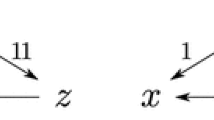Abstract
A voting scheme assigns to each profile of alternatives reported byn individuals a compromise alternative. A voting scheme is strategy-proof if no individual is better off by lying, i.e., not reporting a best alternative. In this paper the main results concern the case where the set of alternatives is the Euclidean plane and the preferences are Euclidean. It is shown that for strategy-proof voting schemes continuity is equivalent to convexity of the range of the voting scheme. Using a result by Kim and Roush (1984), this leads to characterizations of surjective or unanimous, anonymous, strategy-proof voting schemes.
Furthermore, the paper contains an extensive discussion of related results in the area.
Similar content being viewed by others
References
Arrow KJ (1963) Social choice and individual values. Wiley, New York
Barberà S, Gul F, Stacchetti E (1990) Generalized median voter schemes and committees. Barcelona and Stanford University (revised version, May 1991; forthcoming in Journal of Economic Theory)
Barberà S, Masso J, Neme A (1992) Voting under constraints. Barcelona and San Luis
Barberà S, Peleg B (1990) Strategy-proof voting schemes with continuous preferences. Social Choice and Welfare 7:31–38
Barberà S, Sonnenschein H, Zhou L (1991) Voting by committees. Econometrica 59:595–609
Black D (1948) On the rationale of group decision making. Journal of Political Economy 56:23–34
Border KC, Jordan JS (1983) Straightforward elections, unanimity and phantom voters. Review of Economic Studies 50:153–170
Bordes G, Laffond G, Le Breton M (1990) Strategy-proofness issues in some economic and political domains. Working Paper, GREQE, Marseille (forthcoming in Economic Theory)
Bordes G, Le Breton M (1989) Arrovian theorems with private alternatives domains and selfish individuals. Journal of Economic Theory 47:257–281
Chichilnisky G, Heal G (1981) Incentive compatibility and local simplicity. University of Essex and Columbia University
Gibbard A (1973) Manipulation of voting schemes: A general result. Econometrica 41:587–601
Kim KH, Roush FW (1981) Properties of consistent voting systems. International Journal of Game Theory 10:45–52
Kim KH, Roush FW (1984) Nonmanipulability in two dimensions. Mathematical Social Sciences 8:29–43
Laffond G (1980) Révelation des préférences et utilités unimodales. Thesis, Paris
Le Breton M, Sen A (1991) Strategyproof social choice functions over product domains with unconditional preferences. Marseille and New Delhi (second version: 1992)
Motzkin TS (1935) Sur quelques propriétés caractéristiques des ensembles convexes. Rend. Reale Acad. Lincei, Classe Sci Fis, Mat Nat 21:773–779
Moulin H (1980) On strategy-proofness and single peakedness, Public Choice 35:437–455
Moulin H (1984) Generalized condorcet-winners for single peaked and single-plateau preferences. Social Choice and Welfare 1:127–147
Peters H, van der Stel H, Storcken T (1991) On uncompromisingness and strategy-proofness. Report M91-15, Maastricht, The Netherlands
Peters H, van der Stel H, Storcken T (1992a) Pareto optimality, anonymity, and strategy-proofness in location problems. International Journal of Game Theory 21:221–235
Peters H, van der Stel H, Storcken T (1992b) Independence of irrelevant alternative and strategy-proofness on economic domains. In: Game Theory and Economic Applications, Dutta et al. (ed) 442–454
Satterthwaite M (1975) Strategy-proofness and Arrow's conditions: Existence and correspondence theorem for voting procedures and social choice functions. Journal of Economic Theory 10: 187–217
Valentine FA (1964) Convex sets. McGraw-Hill, Inc., New York
Author information
Authors and Affiliations
Rights and permissions
About this article
Cite this article
Peters, H., van der Stel, H. & Storcken, T. Range convexity, continuity, and strategy-proofness of voting schemes. ZOR - Methods and Models of Operations Research 38, 213–229 (1993). https://doi.org/10.1007/BF01414216
Issue Date:
DOI: https://doi.org/10.1007/BF01414216




